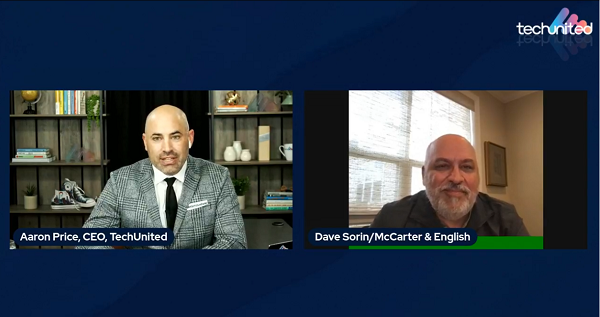Questions for David Sorin of McCarter & English from Aaron Price of TechUnited:NJ
Earlier this month, David Sorin, chair of the Venture Capital & Emerging Growth Companies practice at the law firm McCarter & English (East Brunswick), appeared in a short Facebook Live chat with Aaron Price, president and CEO of TechUnited:NJ (New Brunswick).
He gave advice to startup founders, and to anyone who might be considering investing in a SPAC or in NFTs.
Price peppered Sorin with questions, and we recount some of them for you below. You can find the whole video of the chat here.
AP: What is one of the biggest mistakes that founders make when they are starting their companies, from a legal point of view?
DS: I think one of the most serious issues that we see is when there are multiple founders and they don’t carefully consider what the equity allocation among those founders should be. … It’s very easy to get into the work of rolling this company out and say, “We’re in it together, we’re equal partners, so we’re going to share equity equally.” And while sometimes that’s the case, more often than not equality is not the right answer, and the equity allocation should be more carefully considered to include items such as relative contributions, or relative importance, or who the investors are going to be relying on to accomplish the goals of the company. So, I think it really does warrant a careful discussion. It’s a hard discussion to have among cofounders, but I think it is very important.
AP: Do you recommend that founders be vested when they form the company, or should they wait until they get that first round of financing?
DS: I don’t recommend punting on the issue. I do think that founder vesting is a critical aspect to be considered at formation or at the issuance of the founder equity. … We know investors think it’s important because they want to make sure that the people whom they are relying on to get the job done are “handcuffed” appropriately. But it’s really important for founders as well, because if you don’t have vesting and a founder ever needs to leave, or you want them to leave, you don’t want them to go with this fully vested potentially large slug of equity. … And, even more important, when you have to fill the lost skill set, you’re undoubtedly going to need to equitize the replacement. Without a mechanism to reclaim unvested equity, the potential dilutive effects of equitizing the replacement can be very costly.
AP: Share with people what a SPAC is, what makes the SPAC mechanism work and what you’re seeing in the market.
DS: The acronym SPAC stands for “special purpose acquisition company.” There are two types. There are SPACs that have what we call “blank check authority,” given to the company to acquire whatever it would like to acquire; and those are more problematic, obviously, because there’s so much uncertainty associated with them. And then there are SPACs … like one I was just engaged on this morning, that know exactly the industry sector, [have] already identified the targets, and the targets want to be acquired. SPACs have a very powerful place in the ecosystem. [We have seen] a lot of SPAC activity, but there has been a considerable drop off recently. [We saw] the SEC coming out and making a statement that it’s going to be looking more closely at SPACs. It reminds me a little bit of the cryptocurrency craze that existed a couple of years ago, when many of the transactions really were not viable ones. … I worry less about institutional investors, when we’re talking about SPAC transactions, than I do about individual retail investors. Retail investors need to be careful.
AP: One of the things that has become very popular in the last several months is the non- fungible token (NFT).
DS: I’m so glad you raised this question. This is a very exciting development, if you will, [for me] as a lawyer, but also as someone who’s interested in economic trends. NFTs are basically blockchain-empowered marketplaces for digital assets. These digital assets employ the blockchain for trading purposes, for authentication, for ownership, etc. We’re working on a deal right now with a Los Angeles-based company working with renowned musicians who are creating digital versions of themselves and are seeking to monetize by selling interests in their digital selves. It’s absolutely fascinating. We’re working on that right now. But it is by no means limited to the entertainment industry. We’re seeing this happen in this sort of digital asset creation. It’s somewhat akin to the securitization of mortgages, that we heard about so much in the past. We’re basically empowering investment in large assets that historically individuals could not participate in, such as real estate projects, fine art and gems.




